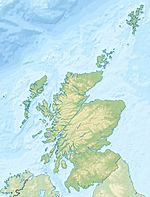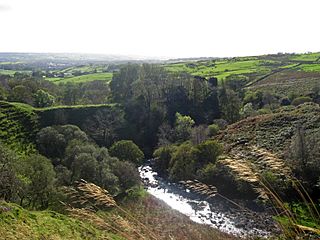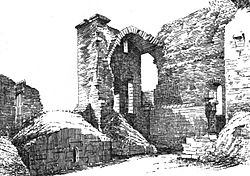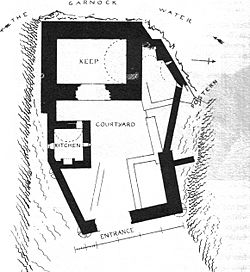Glengarnock Castle facts for kids
Quick facts for kids Glengarnock Castle |
|
|---|---|
| Kilbirnie, North Ayrshire, Scotland UK |
|
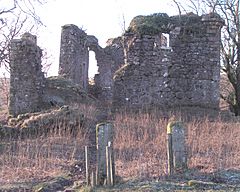
The entrance to Glengarnock Castle
|
|
| Coordinates | 55°46′48″N 4°41′44″W / 55.77998°N 4.69567°W |
| Type | Tower |
| Site information | |
| Controlled by | Cunninghame clan |
| Open to the public |
Private |
| Condition | Ruined |
| Site history | |
| Built | 15th century |
| Built by | Cunninghames |
| In use | Until early 18th century |
| Materials | Stone |
Glengarnock Castle is an old ruined castle in Ayrshire, Scotland. Its main tower, called a keep, stands on a high, rocky spot. This spot overlooks the River Garnock, about 2 miles (3 km) north of Kilbirnie in North Ayrshire.
No one knows exactly when or by whom the castle was built. It might have been built by the Cunningham family or by the Riddels, who lived there before them. The castle is named after the nearby River Garnock and the glen (a narrow valley) it sits in.
In 1841, the castle ruins were made stronger by William Cochran Patrick. This happened after part of the castle fell down in a storm in 1839. Workers fixed the foundations and walls. They also cleared out all the dirt and rubbish that had built up over more than a hundred years. Even with these repairs, the castle is still slowly falling apart.
Castle History: Who Lived Here?
In the 1100s and 1200s, the De Morville family owned the land around Glengarnock. They were important officials for the King of Scotland. They might have built an early castle here, as it was a good location near the abbey they started in Kilwinning.
Later, the land and castle passed to the Riddels and then to the Cunninghame family. A famous visitor to the castle was Mary, Queen of Scots, who came in 1563.
Sir James Cunningham built a special part of Kilbirnie Auld Kirk (a church) in 1597. The Cunninghame family owned Glengarnock Castle until the early 1600s. By the 1700s, the castle was no longer used and became a ruin.
In 1677, Patrick Lindsay bought the castle and land from Richard Cuninghame, who was the last Cuninghame to own Glengarnock. By 1707, Glengarnock was joined with the Kilbirnie estate.
What Glengarnock Castle Looks Like
Glengarnock Castle is a type of castle called a keep with a courtyard. It was built between 1400 and 1542. Other buildings were added in the courtyard later.
The castle sits on a steep ridge (a long, narrow hill) high above the River Garnock. The river flows around two sides of the hill. The valley is about 80 feet (24 meters) deep. This made the castle a very safe place to defend in olden times.
The only way to get to the castle was from the northeast. About 30 yards (27 meters) from the entrance, there was a dry moat (a ditch without water). A drawbridge likely crossed this moat to protect the entrance.
In 1956, this dry moat was still 30 meters long, 4 meters deep, and 8 meters wide. In 1964, people found signs of a small building between the moat and the castle. It might have been a farm building.
The castle had a main tower, which was 45 feet (14 meters) long and 33 feet (10 meters) wide. It was more than 40 feet (12 meters) tall. The top floor of the tower had a large hall with a high, arched ceiling. This hall had windows looking out over the courtyard and the river valley.
A narrow, round staircase led from the hall to the very top of the building. The top was surrounded by a low wall. The castle ruins don't show many arrow-slits (narrow openings for archers) or gun-ports (openings for guns). This might be because its location was so naturally strong that it didn't need many extra defenses.
John Smith wrote in the 1890s that a large pile of rubbish had built up below the castle over many years. This pile was mostly made of ash from local coal, along with broken pieces of tiles and glass.
Just below the castle, on the River Garnock, there is a pool called Garrat's Linn.
Images for kids


